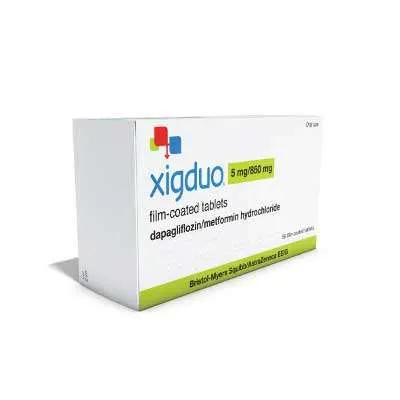Xigduo
$108.95
Xigduo
Dapagliflozin Propanediol Monohydrate, Metformin
Reasons to buy

XIGDUO
(Dapagliflozin and Metformin Hydrochloride)
WHAT IS XIGDUO?
HOW DOES XIGDUO WORK?
XIGDUO contains metformin. Metformin is a biguanide and improves the body’s tolerance for glucose by reducing the absorption of glucose in the intestine, lowering glucose production in the liver, and improving the peripheral uptake and use of glucose.
WHAT ARE THE INDICATIONS FOR XIGDUO?
WHAT IS THE DOSE OF XIGDUO?
- 5 mg dapagliflozin and 850 mg metformin
- 5 mg dapagliflozin and 1000 mg metformin
The starting dose of XIGDUO is one tablet taken twice a day. When starting XIGDUO, a combination of tablets should be taken so that the patient receives 10 mg of dapagliflozin every day and approximately the same dose of metformin that they were taking before they started XIGDUO. The medication should be taken with food. The tablet should not be crushed, chewed, or cut. Dose titrations should be done while carefully monitoring for adverse events.
WARNINGS AND PRECAUTIONS
Hypotension
XIGDUO has been reported to cause a reduction in blood volume, leading to low blood pressure. It occurs more commonly in patients with renal impairment, older patients, and patients with preexisting low blood pressure. Therefore, ensure that any underlying volume deficit is replaced in the patients before starting XIGDUO. Monitor patients taking diuretics closely.
Lactic Acidosis
XIGDUO contains a drug called metformin. Metformin may accumulate in the body, causing a rare but potentially serious complication called lactic acidosis. The risk of developing lactic acidosis increases when the patient has liver failure, renal failure, congestive cardiac failure, sepsis, excessive alcohol intake, or dehydration. The onset of lactic acidosis may initially not be noticed, presenting with symptoms of tiredness, muscle soreness, shortness of breath, and abdominal pain. Laboratory tests show a low pH, high blood lactate, and an increase in the anion gap. If the diagnosis of lactic acidosis is considered, the patient should be admitted to the hospital for further management, and XIGDUO should immediately be stopped.
Hypoglycemia
XIGDUO, when used together with insulin or drugs that stimulate the secretion of insulin, can cause low blood sugar (hypoglycemia). Therefore, a lower dose of insulin or insulin secretion stimulators should be used in combination with XIGDUO.
Vitamin B12 deficiency
Metformin may cause a deficiency of Vitamin B12. Levels should be measured once a year.
Genital fungal infections
XIGDUO increases the risk of developing fungal infections on the genitals.
Bladder cancer risk
XIGDUO may increase the risk of bladder cancer. Do not start XIGDUO on patients with active bladder cancer. Use XIGDUO with care in patients who have a history of bladder cancer.
SPECIAL POPULATIONS
Renal Failure or Impairment
Dapagliflozin elimination is not affected by renal dysfunction. However, metformin is retained longer in the body in patients with renal dysfunction. Because of the accumulation, the use of XIGDUO is contraindicated in patients with renal dysfunction or renal failure or patients on dialysis. In addition, Dapagliflozin can cause a reduction in vascular blood volume. This may lead to symptomatic hypotension, which can be more severe in patients with renal dysfunction, in the elderly patient, or in those taking diuretics such as furosemide.
Hepatic Dysfunction
Metformin may cause lactic acidosis in patients with hepatic dysfunction or failure. As a result, XIGDUO should not be used in patients who have ongoing liver dysfunction or who have elevations in their hepatic liver enzymes (ALT).
Elderly
Metformin blood levels are increased in elderly patients. This seems to be primarily driven by the loss of renal function seen in elderly patients. As a result, XIGDUO should not be started in patients who are older than 80 years of age without first checking their renal function.
Dapagliflozin can cause a reduction in vascular blood volume. This may lead to symptomatic hypotension, which can be more severe in patients with renal dysfunction, in the elderly patient, or in those taking diuretics such as furosemide.
Pediatrics
There are little long-term clinical data to determine the safety of dapagliflozin in pediatric patients. There are little data to guide the use of metformin extended-release formulations in the pediatric population.
Pregnancy
XIGDUO has not been studied in pregnant women, and the amount of drug expressed in breast milk is unknown. Therefore, use during pregnancy should only be considered if the potential benefit to the mother outweighs the risk to the fetus. XIGDUO should not be taken when breastfeeding.
CONTRAINDICATIONS
XIGDUO is contraindicated in:
- Patients with hypersensitivity to dapagliflozin or metformin
- Established renal failure – eGFR < 30 ml/min/1.73m2
- Patients on dialysis
- Metabolic acidosis
- Diabetic ketoacidosis
SIDE EFFECTS
Common side effects of XIGDUO include:
- Diarrhea
- Nausea
- Vomiting
- Headache
- Symptoms similar to a cold – stuffy nose, sinus pain, sneezing
- Infections of the urinary tract
- Genital fungal infections
Less common side effects include:
- New or unusual pain in the muscles
- Difficulty breathing
- Pain in the stomach or vomiting
- Abnormal heart rate
- Changes in vision
- Possible increased risk of bladder cancer
If any of these side effects are noticed, a doctor should be contacted immediately.
DRUG INTERACTIONS
Certain drugs may interact with XIGDUO. These include:
- Amiloride
- Cimetidine
- Morphine
- Digoxin
- Procainamide
- Quinidine
- Quinine
- Ranitidine
- Triamterene
- Trimethoprim
- Vancomycin
Care should be taken when using XIGDRO XR with other medications that can cause an increase in blood glucose levels. This includes:
- Thiazides
- Diuretics
- Corticosteroids
- Phenothiazines
- Thyroid products
- Estrogens
- Oral contraceptives
- Phenytoin
- Nicotinic acid
- Sympathomimetics
- Calcium channel blocking drugs
- Isoniazid
| Quantity | 5mg/850mg – 60 tabs |
|---|
